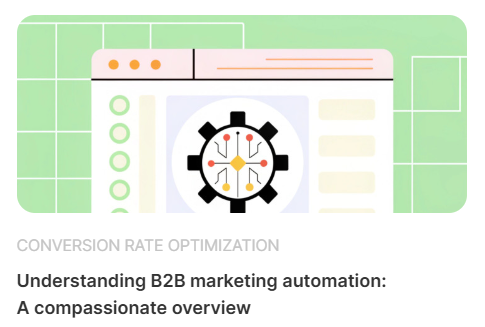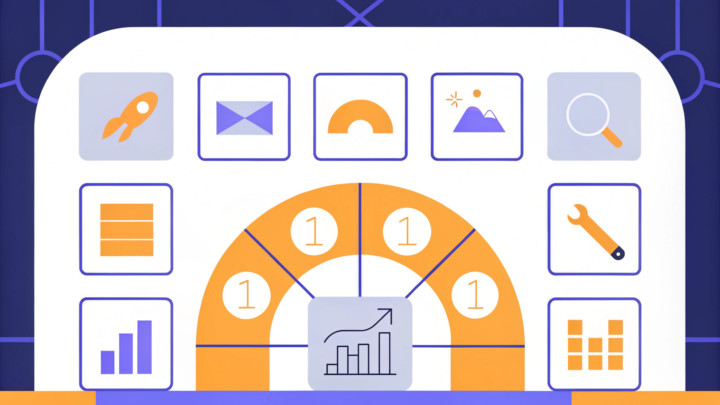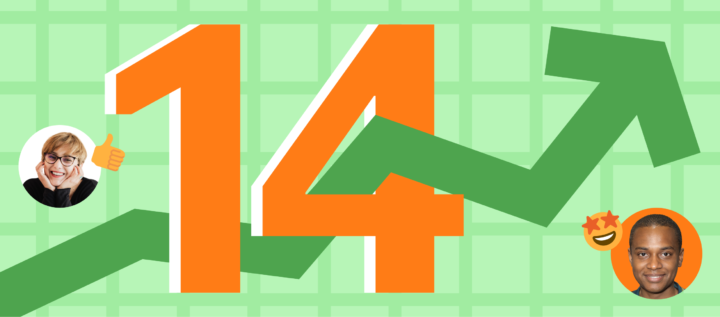Understanding the features of marketing automation software: A comprehensive guide for marketing and sales teams

Overview
Managing a sales funnel is no easy feat, and we understand the daily challenges you face. Marketing automation software can be a game changer, helping to ease the burden of repetitive promotional tasks. By streamlining these processes, it enhances your operational efficiency and allows for effective lead management. This means you can dedicate more time to what truly matters — strategic growth.
Imagine being able to focus on high-priority leads while automated email campaigns and audience segmentation work in the background. Statistics show that businesses utilizing these tools see increased leads and website traffic, empowering you to compete even in a crowded market. It’s not just about keeping up; it’s about thriving.
You’re not alone in feeling overwhelmed. Many entrepreneurs struggle with the same issues, but the solution is simpler than you think. Embracing marketing automation can transform your approach and bring clarity to your efforts. Take the next step today — explore how this software can support your journey and help you achieve your goals.
Introduction
In the competitive landscape of fighting for leads, we understand that marketing can often feel overwhelming. You’re not alone if you find yourself juggling numerous tasks, trying to engage customers while managing daily operations. This is where marketing automation can truly be a game-changer. By harnessing the power of technology, marketing teams, especially smaller ones, can automate repetitive tasks, freeing up precious time to focus on strategic initiatives that drive customer engagement and growth.
As the market evolves, the significance of marketing automation becomes even clearer. Statistics reveal remarkable increases in leads and website traffic for businesses that adopt these tools. It’s not just about keeping up; it’s about thriving in a fast-paced digital world. In this article, we’ll explore the essential features of marketing automation software, the benefits it offers, and best practices for successful implementation. Our goal is to provide you with the insights needed to navigate these challenges confidently and effectively.
What is marketing automation and why is it essential for your sales funnel
Optimizing a sales funnel can feel overwhelming, especially when it comes to managing promotional tasks. Many teams face the daily challenge of juggling multiple responsibilities while trying to stand out in a crowded market. This is where marketing automation software comes into play, offering a lifeline by automating repetitive promotional activities. By streamlining these efforts, small businesses can enhance their efficiency and compete more effectively against larger companies, even with limited resources.
Recent statistics reveal that companies implementing promotional strategies see a remarkable 67% increase in leads. Additionally, businesses with blogs attract 55% more website visitors and generate 67% more leads. These numbers highlight just how crucial promotional technology is for driving growth.
Imagine being able to automate essential tasks like email marketing, social media postings, and lead nurturing. This allows small enterprises to focus on strategic initiatives that foster customer engagement and long-term success. As Luisa Zhou, an expert in online coaching, wisely points out, Streamlining processes enables small businesses to compete successfully and proficiently in today’s market. This insight underscores how promotional technology equips small enterprises with the necessary resources to enhance their strategies.
Moreover, a recent case study shows that a significant majority of marketers plan to increase their use of marketing automation features in the coming years. They recognize the efficiency these tools bring to managing complex promotional environments. This trend reinforces the importance of promotional technology in achieving impressive outcomes.
If you’re feeling the weight of these challenges, know that you’re not alone. Embracing marketing automation can be the key to unlocking your business’s potential. It’s time to take action and explore how these tools can simplify your promotional efforts, allowing you to thrive in today’s competitive landscape.
Learn more:
Key features of marketing automation software for sales and marketing teams
Marketing automation software is here to help you boost operational efficiency and enhance client engagement, offering practical solutions to your challenges. Among its many features, lead capture tools stand out as essential. For example, Dashly’s chatbots and pop-ups enable you to capture leads 24/7, allowing you to connect with prospective clients at any hour and maximize those engagement opportunities.
Imagine having an AI support bot that can manage up to 40% of user queries. This not only showcases the efficiency of automation but also significantly reduces the workload on your team that has to deal with repetitive questions about your product or service. With Dashly’s omnichannel message sequences, your marketing team can effortlessly launch marketing campaigns across channels: first engage on the website, then nurture via email, and then remind of yourself in WhatsApp. Everything is automated and triggered by specific user actions. You don’t have to do lead capture, qualification and nurturing manually and finally focus on high-priority leads.
User behavior tracking is another powerful feature of marketing automation software. It allows you to communicate with leads in a personalized manner, increasing the chances of conversion by delivering tailored offers at just the right time. Audience segmentation is equally crucial; it helps you classify your clientele based on behavior and preferences, ensuring your promotional efforts hit the mark. As Angie, who oversees Cazoomi’s operations, wisely states, ‘As always, balance is key.’ This highlights the importance of blending automation with personal touch in your marketing strategies.
And finally let’s not overlook the robust analytics tools that come with marketing automation software. These are indispensable for providing insights into campaign performance and allowing you to monitor your strategy’s effectiveness across channels. Each tools at Dashly comes with its own analytics, so you can track engagement rate, CTR and conversions. This data-focused approach enables you to continually enhance your strategies, optimizing both promotional initiatives and customer assistance for better outcomes and greater return on investment.
However, we recognize that implementing these tools can be challenging for small businesses. In fact, 32% of small enterprises cite a lack of resources, and 31% mention budget constraints as significant hurdles. This underscores the complexities involved in adopting marketing technology. But remember, you’re not alone in this journey. The right tools and support can make a world of difference in navigating these challenges.
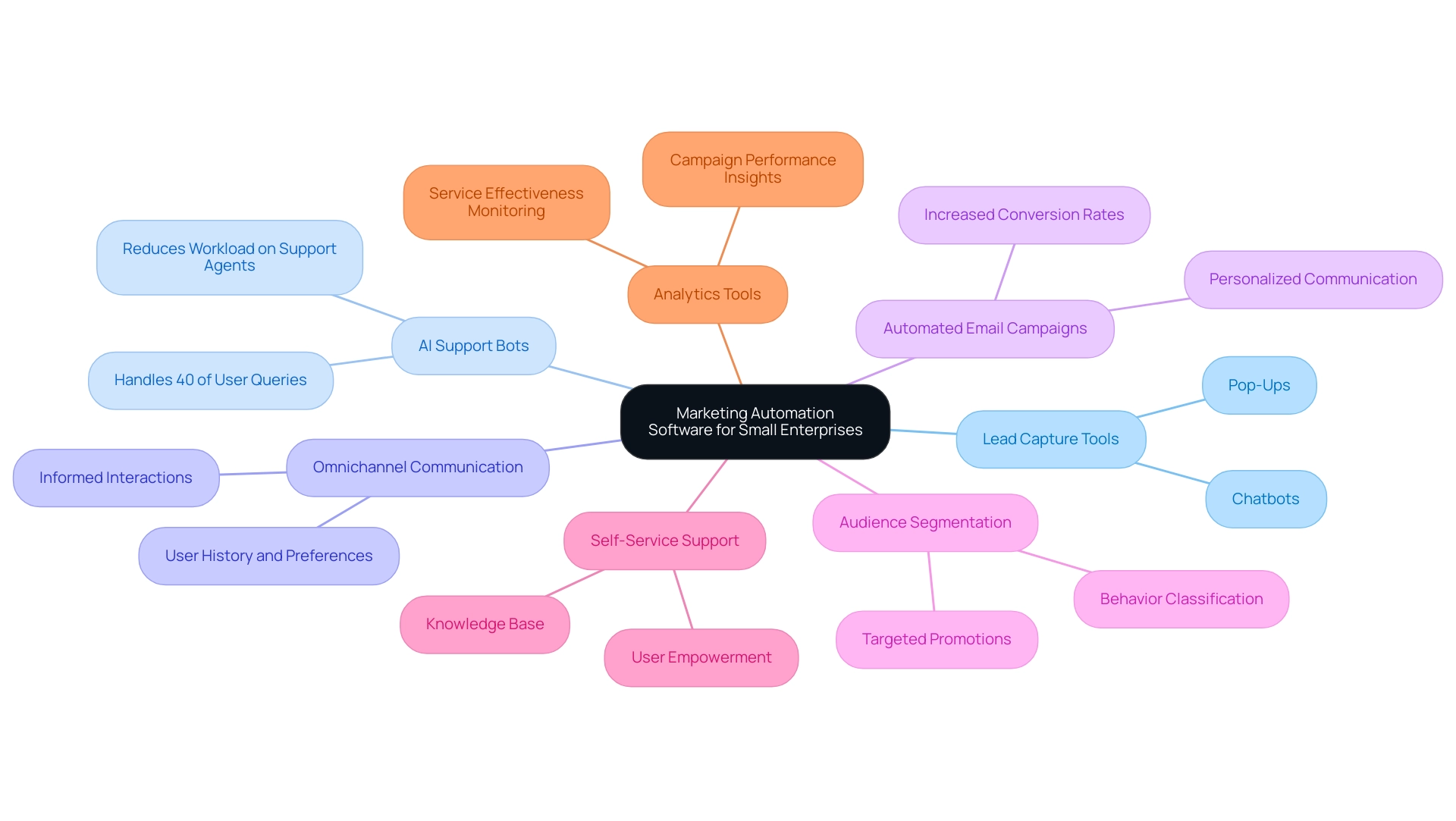
Optimize your funnel with marketing automation tools from Dashly:
Benefits of marketing automation: Boosting efficiency and growth
Running a small business can be tough, especially when you’re looking to grow in 2025. You’re likely juggling countless tasks, and the thought of finding ways to improve efficiency can feel overwhelming. But here’s the good news: the execution of promotional systems can significantly boost your operational efficiency. Many companies using mechanization tools report remarkable time savings on repetitive tasks, allowing teams to focus on what really matters — strategic activities that drive growth.
As you navigate this landscape, consider the marketing technology industry, which was valued at $344.8 billion in 2021 and is projected to grow at a compound annual growth rate (CAGR) of 12.9%, reaching an estimated $13.71 billion by 2030. This growth highlights the importance of adopting effective strategies to stay competitive.
Marketing automation software can be a game changer for lead management. With improved targeting and nurturing strategies, you can engage prospects more effectively. By personalizing your communications and timing them just right, you not only enhance relationships but also see higher conversion rates. The ability to tailor messages to consumer behavior and preferences resonates deeply with potential clients, fostering stronger connections and ultimately leading to increased sales.
Yet, we understand that embracing automated processes can come with its own set of challenges. Initial implementation costs and a natural reluctance to change can make the transition daunting. It’s crucial to address these hurdles head-on. Organizations that take the time to plan and execute their projects thoughtfully can mitigate risks and truly harness the benefits.
In fact, Gartner predicts a significant shift in practices; by 2026, over 30% of enterprises will automate more than half of their network activities, a substantial increase from less than 10% in mid-2023. Additionally, it’s noteworthy that 73% of small enterprises maintain a website. This underscores the importance of integrating marketing automation strategies to enhance your online presence and engagement. These efficiencies aren’t just theoretical; they lead to tangible growth and a stronger competitive position, empowering small businesses like yours to thrive in today’s demanding market.
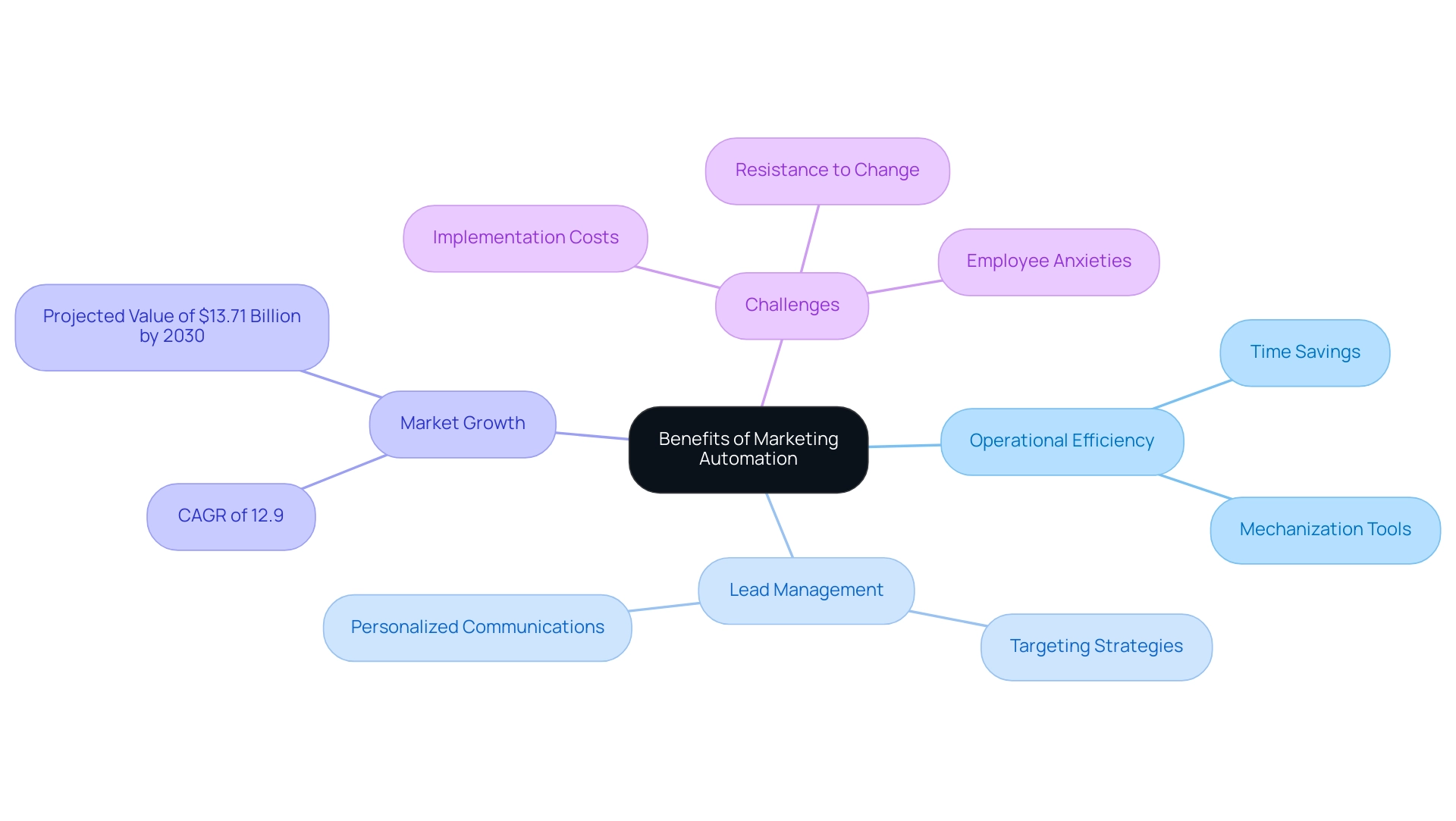
Effective lead management: Nurturing and converting prospects
Efficient lead management is essential for any marketing team striving to turn prospects into loyal clients. We understand the challenges you face, and that’s where marketing automation software can make a significant difference. By allowing businesses to segment leads based on behavior and engagement, tools like Dashly’s advanced multi-step omnichannel campaigns help nurture leads through the sales funnel. These campaigns deliver targeted messages via email, push notifications, chat, and messengers ensuring potential customers receive timely and relevant communications that enhance their journey toward conversion.
Automating follow-ups and nurturing sequences not only streamlines your process but also fosters consistent engagement with leads. In fact, statistics reveal that 77% of marketers who leverage marketing automation features see higher conversion rates compared to those who don’t. As the average B2B sales process took 25% longer in 2024 than five years prior, effective lead management becomes even more crucial for small businesses navigating these hurdles.
As HydroWorx points out, “Our marketing department has a lot of key performance indicators that WebFX has always helped us achieve… WebFX has always worked hard to make sure that we’re getting what we need out of the partnership, not just what may seem like the best result.” This underscores the importance of utilizing marketing automation features to effectively reach your key performance indicators.
While automation is vital, let’s not forget the power of personal interactions in building trust and converting leads. The case study on door-to-door sales illustrates that persistence and high-volume prospecting are key. A balanced approach that combines automation with personal touch can significantly enhance lead management efficiency. By embracing these tools and strategies, small businesses can greatly improve their chances of converting leads into satisfied clients, ultimately supporting sustained growth and success in a competitive market.
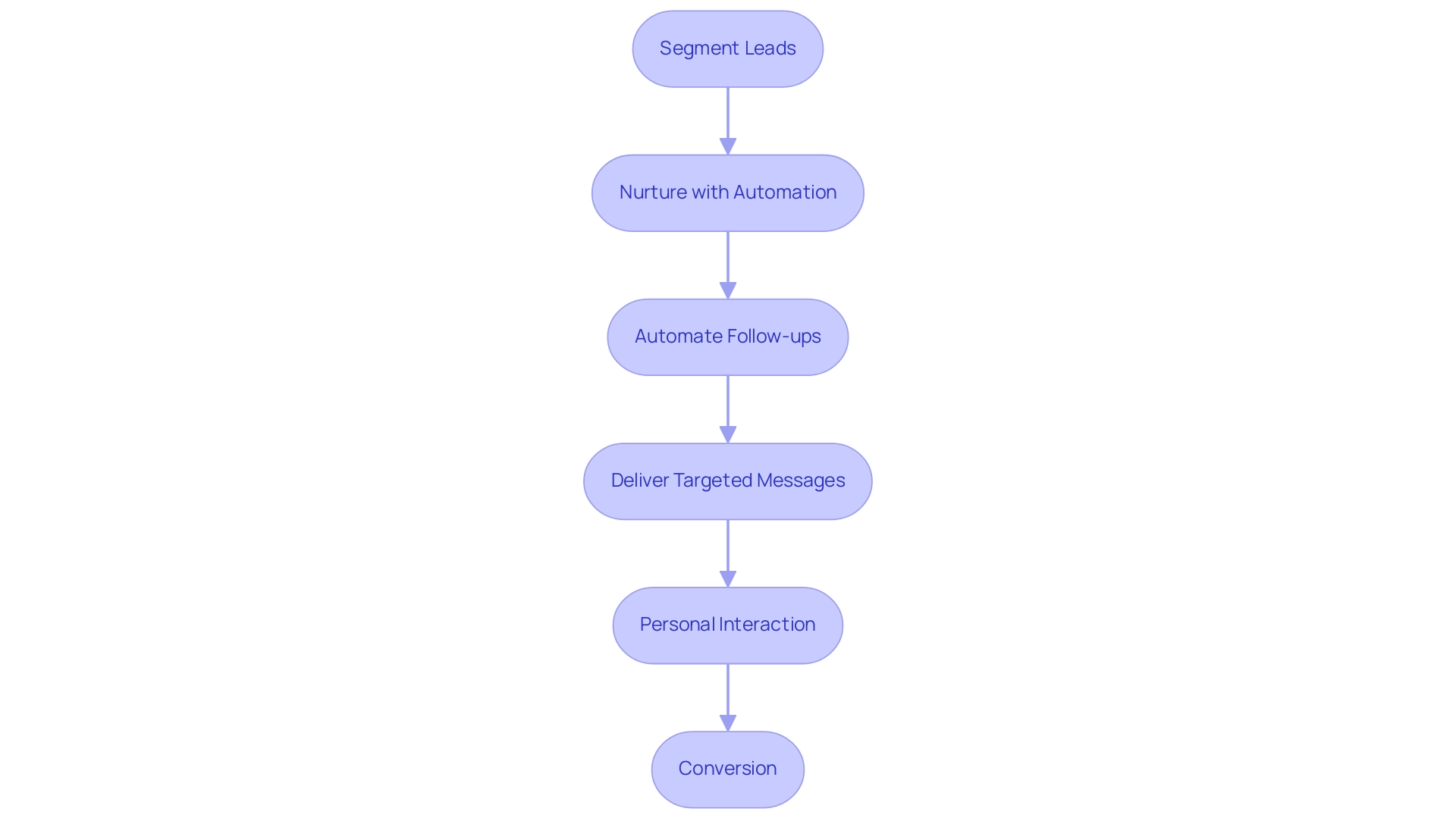
Optimize your funnel with marketing automation tools from Dashly:
Integrating marketing automation with your existing tools and platforms
Working on a sales funnel comes with its own set of challenges, especially when it comes to managing marketing technology. We understand how overwhelming it can feel to juggle multiple tools and platforms. That’s where the right integration can truly make a difference. By incorporating marketing automation software into your existing systems, you can streamline your processes and alleviate some of that stress.
Consider solutions like Dashly, which seamlessly connect with various CRM systems, email marketing platforms, and analytics tools. Imagine how much easier it would be if you could reduce the time spent on creating reports for client interactions. In fact, a recent statistic reveals that 88% of marketers value automation tools that integrate these features, highlighting a clear need for such solutions.
This integration fosters a unified approach to customer engagement, a hallmark of effective marketing automation software. It allows for smoother data flow across channels, ultimately enhancing your interactions with clients. As productivity writer Beatrice Manuel puts it, ‘With its integration into contemporary promotional strategy, substantial benefits such as efficiency, cost savings, and increased client involvement become clear.’ It’s reassuring to know that these technologies are gaining acceptance and proving effective across various business sizes.
Moreover, a case study titled ‘AI in Promotional Strategies’ reveals that 74% of marketers anticipate that over a quarter of their tasks will be AI-automated by the end of next year. This trend underscores the growing importance of AI in promotional efforts and its connection to tools like Dashly.
By ensuring that your automation solutions work harmoniously with your current systems, you can significantly enhance your overall customer experience. The features of marketing automation software are designed to empower you, making it easier to engage with your clients meaningfully. You’re not alone in this journey — embracing these tools can lead to a more efficient and fulfilling business experience.
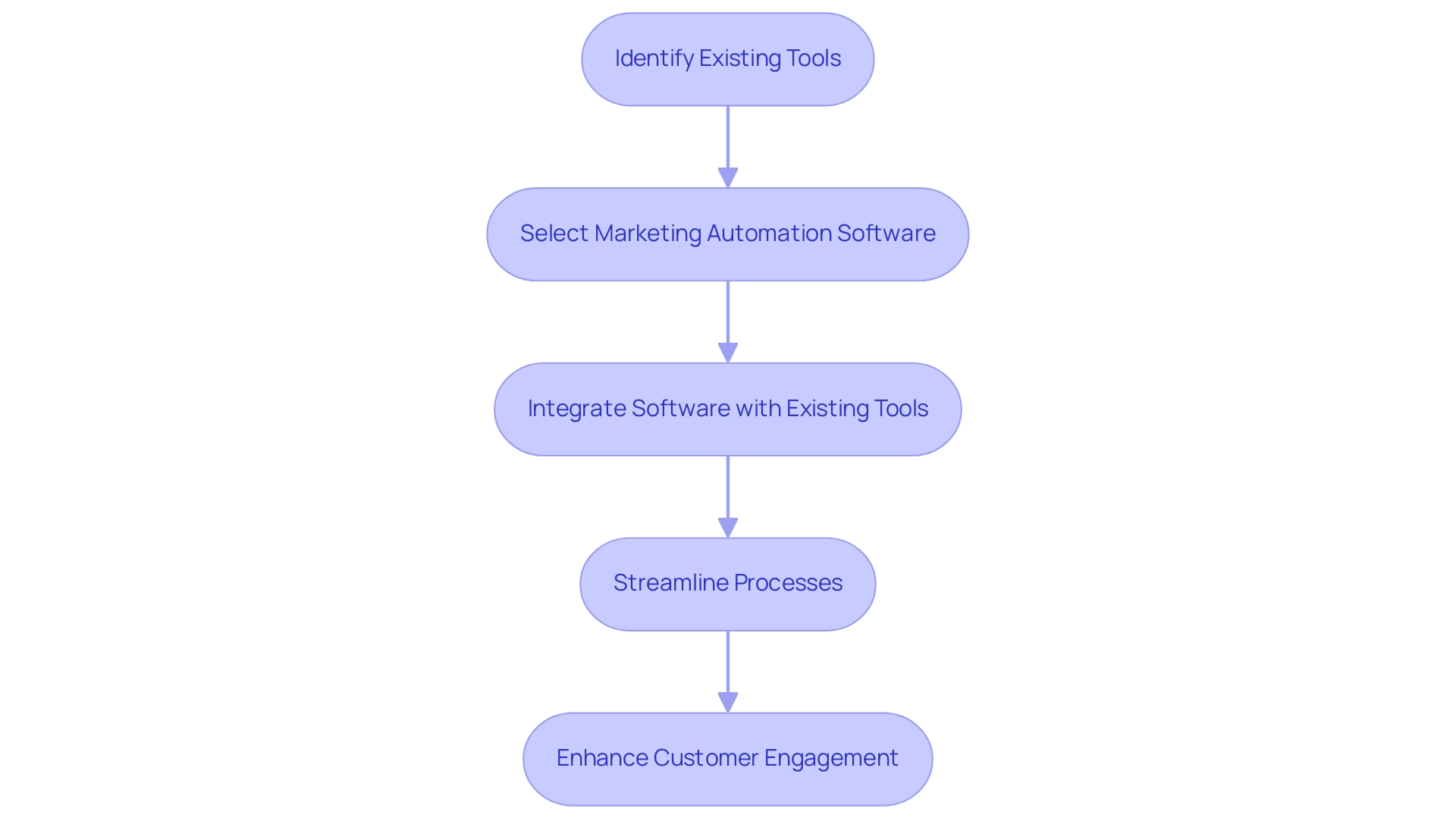
Best practices for implementing marketing automation successfully
To effectively execute marketing systems, small enterprises face a range of challenges. Of course, navigating these complexities can be overwhelming. That’s why it’s essential to start by clearly outlining distinct aims and objectives for automation, ensuring they align with your overall corporate strategies. This focus on goal-setting is not just a best practice; it’s backed by the fact that 65% of marketers who set clear objectives report successful outcomes from their efforts. Training and support in this area are crucial, and you’re not alone in seeking guidance.
Next, let’s talk about audience segmentation. Dedicating sufficient time to this process can significantly boost your engagement and conversion rates. By customizing your content to resonate with different client groups, you can create meaningful connections. For example, notifications showcasing popular purchases can instill a sense of urgency and encourage conversions.
Automation is another area to consider. Did you know that 39% of B2B firms plan to introduce automation for their social media management initiatives this coming year? This highlights the growing importance of automation in marketing.
Utilizing tools like Dashly can further enhance your engagement efforts. With its omnichannel marketing automation features, a team of any size can streamline interactions across various platforms, improving conversion rates and enhancing the quality of their communication with leads. Features like user behavior tracking and analytics allow marketing teams to monitor performance metrics effectively.
Regularly analyzing these metrics is key. It enables you to refine campaigns, adapt messaging, and enhance overall engagement. Plus, Dashly offers funnel reports that will allow you to track effectiveness of your funnel, spot bottlenecks and get new ideas for future experiments. You’ll finally have time for ideas generation since such tasks as lead capture, qualification, and nurturing are already covered 😉 It’s significant to note that while only 18% of B2B marketers use systems integrated with a customer data platform (CDP), those that do often see better outcomes.
Finally, thorough training for your team on these tools is crucial. When your promotional staff are well-versed in these technologies, they can harness the full potential of automation, leading to better results and more effective campaigns. However, it’s important to recognize the challenges — 73% of marketers report difficulties in adopting such tools.
By implementing these best practices and leveraging Dashly’s capabilities, marketing teams can navigate the complexities of marketing automation software and achieve their desired outcomes. For instance, by launching chatbots on landing pages, Dashly client EdPro managed to generate +$145k of extra revenue. Take that next step; you’ve got this!
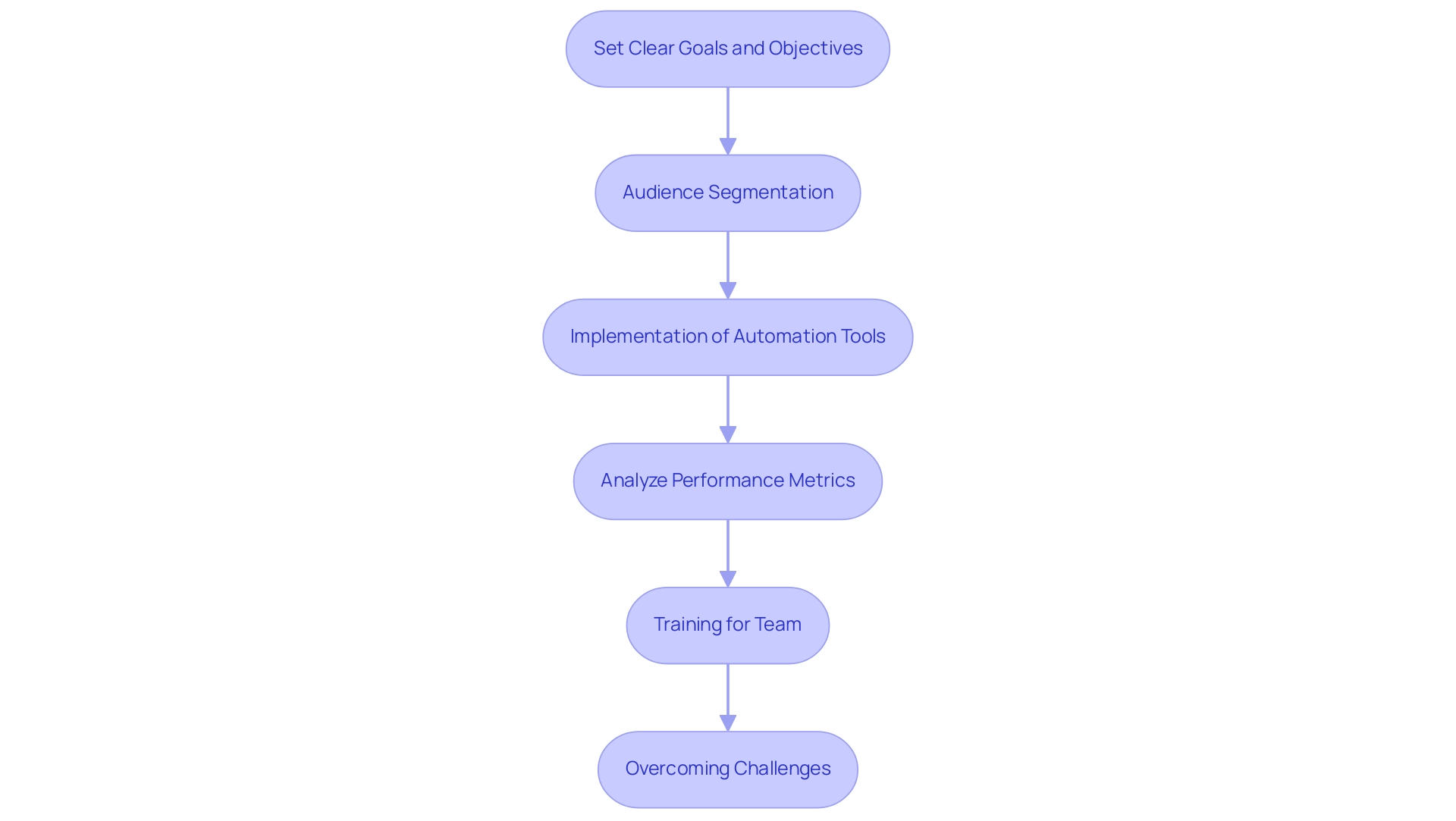
Conclusion
Marketing automation is a vital ally for small businesses striving to enhance their marketing strategies and navigate an increasingly competitive landscape. We understand that managing repetitive tasks like email marketing and lead nurturing can be overwhelming. By automating these processes, small enterprises can streamline their operations, freeing up valuable time for teams to concentrate on strategic initiatives that cultivate customer engagement. The statistics speak volumes; businesses implementing these tools often see significant boosts in leads and website traffic.
Key features of marketing automation software — like lead capture tools, customer segmentation, and robust analytics — empower small businesses to connect with their customers more effectively. Imagine delivering personalized communications that truly resonate with your audience, resulting in higher conversion rates and improved customer satisfaction. However, we recognize that challenges such as limited resources and initial implementation costs can be daunting. Addressing these obstacles is crucial to unlocking the full potential of automation.
Integrating marketing automation with existing tools and platforms enhances its effectiveness, creating a seamless experience for both marketers and customers. Embracing best practices — such as clear goal-setting, audience segmentation, and thorough training — becomes essential for successful implementation. As the marketing automation landscape evolves, adopting these strategies will allow small businesses not just to keep pace but to thrive in a fast-paced digital environment.
In conclusion, adopting marketing automation is not just a trend; it’s a strategic necessity for small businesses aiming to compete effectively. By investing in these technologies and following best practices, you can unlock new levels of efficiency and growth. This ensures you are well-positioned to meet the demands of modern consumers and achieve sustained success. Remember, you’re not alone in this journey — taking that next step can lead to remarkable transformations.
